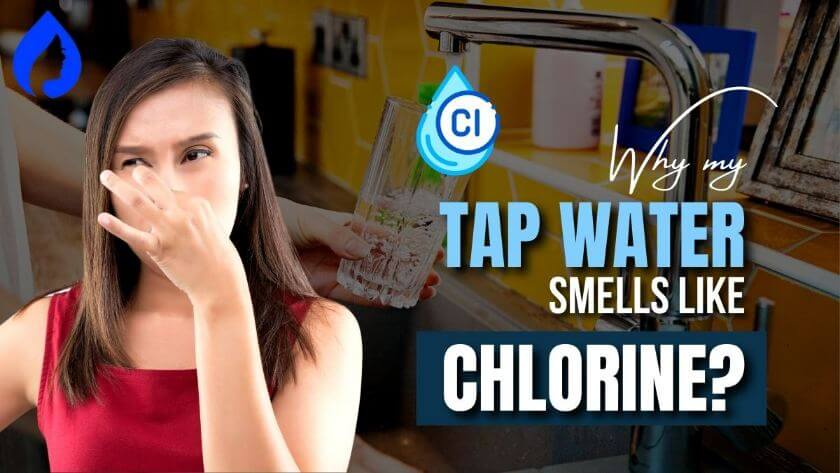
Is your tap water smelling like chlorine? Here’s what you need to know:
Chlorination (where chlorine is manually added to water) is done in public water systems to remove bacteria and impurities.
However, small amounts of residues can remain in the public water supply occasionally. If it is more than 1 mg/L, these chlorination residuals result in the bad smell of chlorine from the water.
As per EPA (Environmental Protection Agency) guidelines, chlorination residuals up to 4 mg/L in water are safe. People who drink excessively chlorinated tap water suffer from conditions like-
Continue reading to find 5 reasons why my tap water smells like chlorine with practical solutions.
Why Does My Tap Water Smell Like Chlorine? [Cheatsheet]
| Reason | Logic | Fix |
| 1. Heavy chlorination in public water systems | To cover loss of chlorination when water is distributed over long distances. | A carbon or a Reverse Osmosis water filter can help with a mild chlorine smell. Otherwise, contact local water authorities. |
| 2. Chlorine reaction with organic materials | The free chlorine (disinfectant) present within your water gets merged with various algae, bacteria, fungi, etc., that thrive within the pipelines to produce THMs (that causes smells like bleach). | Make your water flow from the faucet for some time. |
| 3. Shock Chlorination From Municipal Authorities | Chemical treatment of public water systems is done with bleach to eliminate bacteria. | You may open your faucet and drain the water for 5 to 10 minutes. |
| 4. Your home is located near treatment plants. | The dissipation of the chlorine smell is impossible | Install a whole-house water filtration system. |
| 5. The public treatment system is switching from chloramine to chlorine (sudden smell reason). | Water authorities suddenly switched to chlorine from chloramine treatment to eradicate newer harmful contaminants detected. | Install a whole-house water filtration system. |
Heavy Chlorination In Public Water Systems
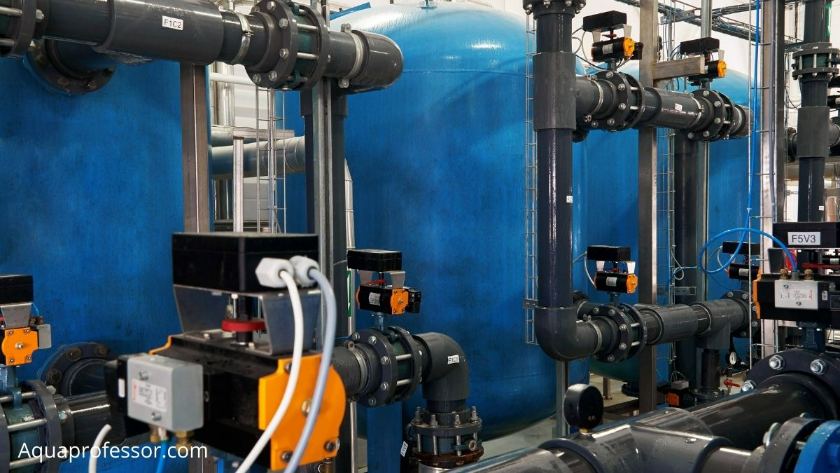
EPA mandates water treatment through chlorine/chloramine for all public water networks before distributing them to households.
The reason is simple:
To protect common people from serious health problems or diseases caused by Legionella, Cryptosporidium, or other bacteria/pathogens.
However, excess chlorination (beyond 4mg/L) can cause vomiting, diarrhea, and stomach disorders.
Though normally, the free chlorine levels in the water supplies of municipal corporations remain within 0.2 to 2.0 ppm (parts per million), it might touch 5.0 ppm.
What’s The Logic Behind It?
The logic is that when the city water supplies get ferried to a long distance, heavy chlorination becomes necessary to compensate for dissipation as the water travels to its destination.
If the weather is warm and the distance for water travel is long, one can expect more negative effects from such excessive chlorination. So, the treatment bodies frequently increase or decrease the chlorine levels over the year, depending on the weather.
How To Fix It?
Excess chlorination (beyond 4mg/L) can cause vomiting, diarrhoea, and stomach disorders. To fix this issue, you can do two things:
Note:
If you are getting a pool-like odor from the water instead of only a bad smell or your water smells like bleach, you must immediately contact the public water authorities. Ask for their help to get cleaner water free of any bleach smell.
Chlorine Reaction With Organic Materials
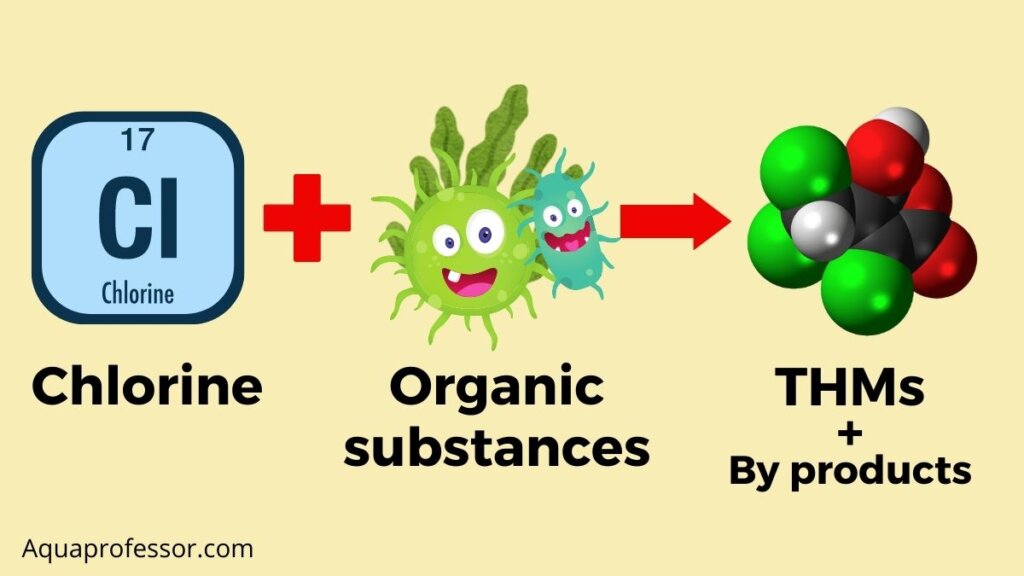
The Logic Behind It:
Sometimes, certain organic substances (for example- algae, bacteria, fungi, etc.) thrive within our water supply pipelines without our knowledge. They secretly mix to form a slimy substance known as a biofilm.
As the chlorinated water (containing the disinfectant chlorine) passes through these pipelines, it comes in contact with these organic compounds or the biofilm.
Trihalomethanes or THMs are produced as by-products when chlorine merges with these organic compounds. The more the amount of organic matter within your water, the stronger the bleach-like odor of the THMs.
Also, THMs are of different types, and the type of THMs produced in your pipeline depends on the quantity of biofilm in your water.
✅ How To Fix:
Also Read: Why Zerowater Tastes Sour?
Shock Chlorination From Municipal Authorities
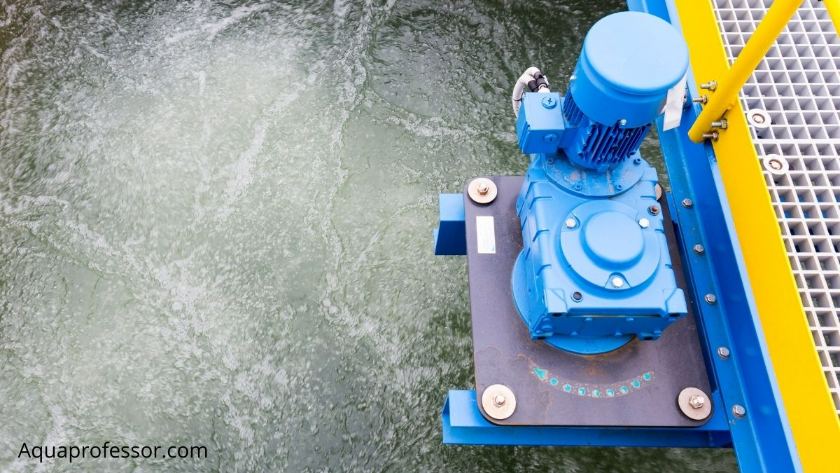
Shock chlorination by municipal authorities may also result in unwanted strong chlorine from your water.
The Logic Behind It:
There is always a risk of bacterial contamination in public water networks after a heavy storm or flood.
The municipal authorities go for the process of shock chlorination of water (a chemical treatment) to make the water safe for the common people again. They add a large amount of chlorine (higher than normal) to the water to eliminate bacteria and other pathogens.
This chemical water treatment post-purification by treatment plants gives tap water a bleach-like odor and taste, though it’s only for a short period, mostly for one or two days.
How To Fix:
You don’t have to do anything to fix it, as it will get resolved by itself, and the smell will disappear gradually.
However, you can make the process fast by draining away water from your faucet at speed for 5 to 10 minutes. If you can still smell chlorine, keep it open until the smell completely travels away.
Also Read: How To Remove Chlorine From Tap Water
Your Home Is Located Near Treatment Plants
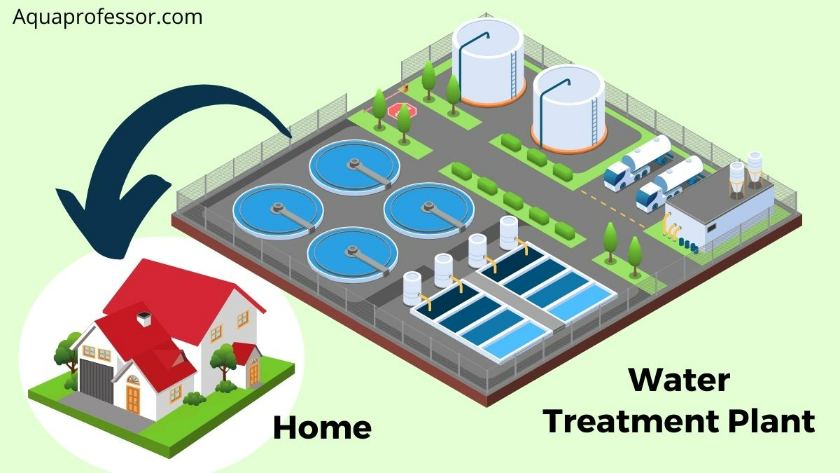
The Logic Behind It Is:
Chlorine, when traveling through the water pipeline, tends to dissipate. Therefore, the longer it travels, the more its dissipation occurs, resulting in a faded smell of chlorine from water.
However, if your house is near the area where the chlorination process occurs, less dissipation will occur before the water reaches your home, resulting in a stronger chlorine odor.
How To Fix It:
You might be tempted to shift your house away from chlorination water plants, but that’ll only be feasible in some cases.
So instead, the best thing you can do is to install a whole-house water filtration system at your home.
The Public Treatment System Is Switching From Chloramine To Chlorine (Sudden Smell)
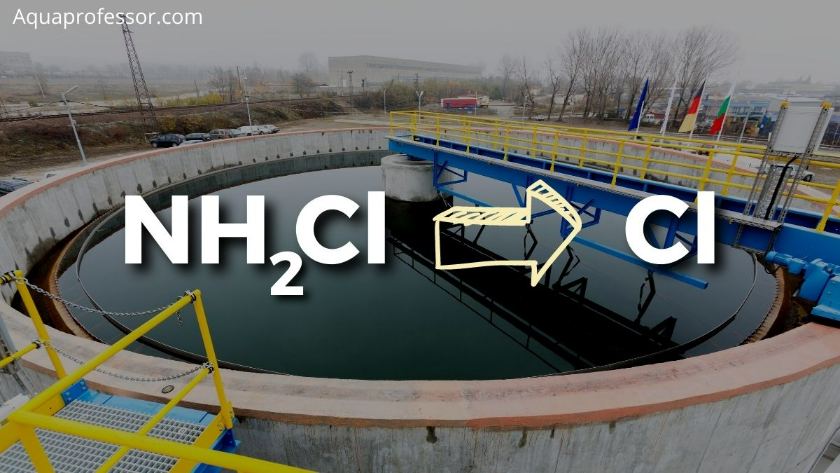
The Logic Behind It Is:
Not all water supplies are treated with chlorine all the time. Some water supplies are less contaminated. Water regulating authorities treat such water supplies with Chloramine (chlorine+ammonia), which produces less odor than chlorine.
However, if the water authorities detect any dangerous or harmful contaminants, they might shift from chloramine to chlorine treatment, and you will smell the chlorine from the water.
How To Fix It?
You can only get rid of this stronger smell of chlorine by purchasing and fitting a whole-house water filter at your home.
7 Easy Ways To Get Rid Of Chlorine Smell In Tap Water
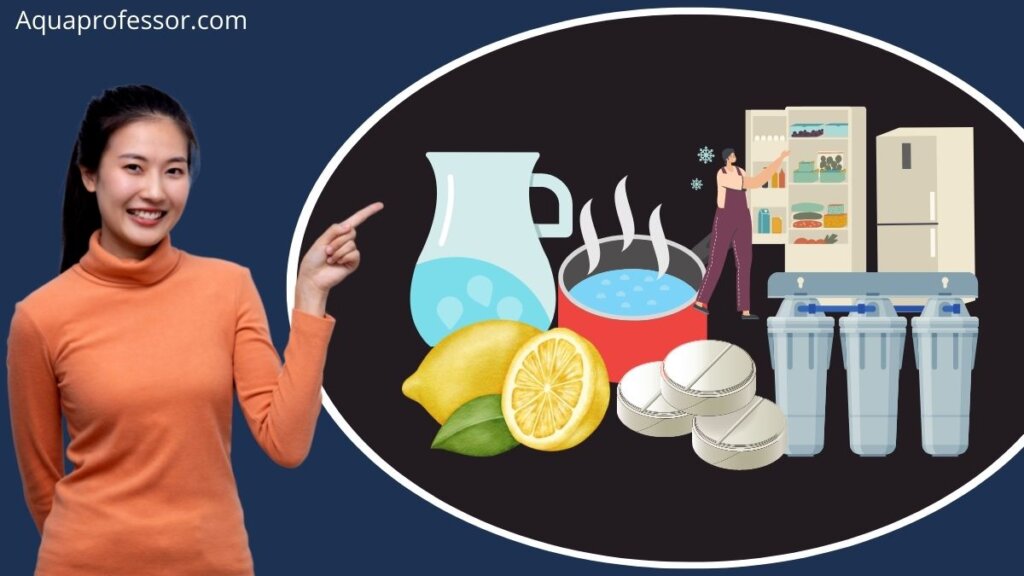
Detecting chlorine in your water (if present) and treating it is important for staying healthy and safe.
You can execute a water chlorine test using self-testing kits from mytapscore.com, recommended by Water Systems Council, or by sending your water sample to any state-certified lab.
If the test results are positive and chlorine is found to be more than 4mg/L in your water, there are a few ways to get rid of it or reduce it:
Home Remedies
i) Let The Water Sit In A Pitcher:
This is applicable for small batches of water, and the process takes 24 hours.
ii) Boil Tap Water:
This process is hassle-free, simple, and less time-consuming for small batches of water. You must keep your home’s faucet water in a vessel and boil it for 15 minutes on a gas stove.
💡Fact:
Boiling the water eradicates the chlorine smell present in your water. After the water cools down, you can use it for drinking or other purposes, as it will no longer evoke the smell of chlorine.
iii) Keep Drinking Water In The Refrigerator:
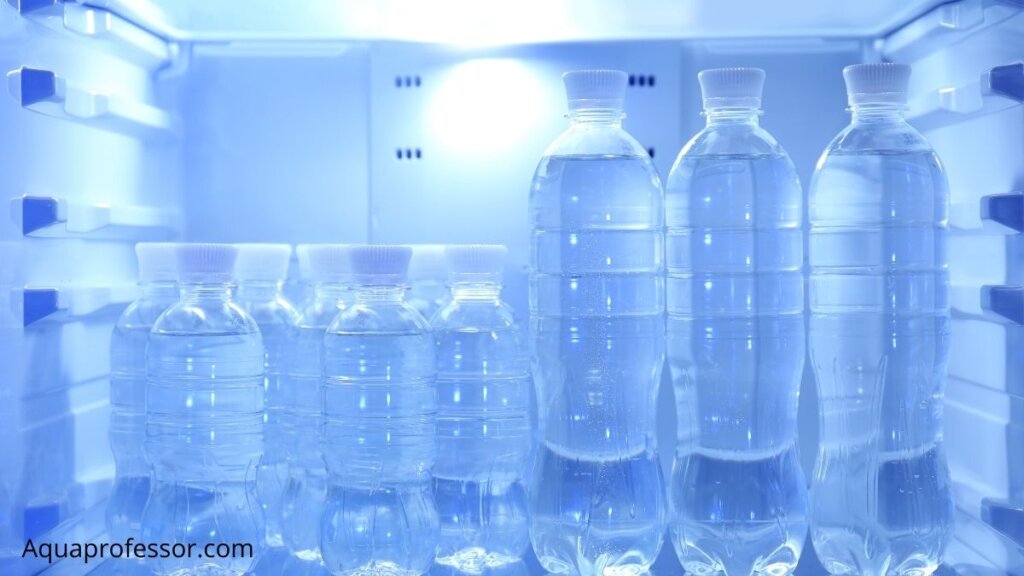
Cooling water inside a refrigerator (at least two hours) improves the tap water’s taste and smell. Also, cold water will probably not absorb lead/copper from your plumbing.
iv) Add Lemon To Water:
Adding lemon or lime slices to water also improves the water’s taste and smell, thus reducing the bad taste and smell of the chlorine in it.
v) Use Campden Tablets:
Dropping Campden tablets (sodium/potassium metabisulfite) in your water helps remove the free chlorine or chloramine from your water. It kills bacteria or wild yeasts (if present in the water) at the same time.
Advanced Remedies
i) POU Under Sink Filtration Systems:
Installing a Point of Use under sink filtration system with reverse osmosis technology at your home will remove the smell of chlorine from your water, hard water minerals like sulfur and iron, and Total Dissolved Solids (TDS). It’s an effective and affordable option for purified and tasty water.
Also Read: Can A Water Softener Remove Chlorine?
ii) Granular Activated Carbon (GAC) Filtration Systems:
These water filtration systems remove contaminants like chlorine and hydrogen sulfide responsible for bad odors and taste in faucet water.
Note:
GAC filtration systems can’t remove heavy metals such as iron or nitrate. Reverse osmosis (RO) filtration systems are best for them.
Tap Water Smells Like Chlorine: FAQs
Why does my well water smell like chlorine?
You are likely using chlorine water filters that discharge pathogen-eliminating chemicals into your well water, but as a by-product, it infuses chlorine odor into your well water.
Can you shower with chlorinated water?
No, research suggests it’s not good to bathe or shower with chlorinated water. In fact, it’s more dangerous than drinking it. This is because bathing in hot water enlarges our skin’s pores, and those pores can absorb the chlorine from the chlorinated water more readily, resulting in over-chlorination in our bodies.
Can too much chlorine poison you?
Yes, if too much chlorine in your water is exposed to your body parts (such as eyes, throat, lungs, etc.) for a prolonged period, it may damage those parts’ tissues.
What is another disinfection process besides chlorination?
Besides chlorination, other treatment methods include:
a. Ozone water treatment process
b. UV (ultraviolet) light,
c. Chloramines,
d. Potassium permanganate process,
e. Photocatalytic disinfection process,
f. Nanofiltration process, and
g. Chlorine dioxide treatment.
5. Does bottled water has chlorine in it?
The manufacturers of Bottled mineral water usually pass the water through a reverse osmosis system or distiller to eliminate unwanted components like chlorine before filling it inside the bottle. So, bottled mineral water doesn’t retain any chlorine taste in it.
Adarsh is a Health & Nutrition Sciences graduate with expertise in environmental health. He is associated with ventures like Glacier Fresh Filter and Simpure Filter Systems. Through Aqua Professor, he intends to provide helpful information to every home to help them make smarter decisions.
